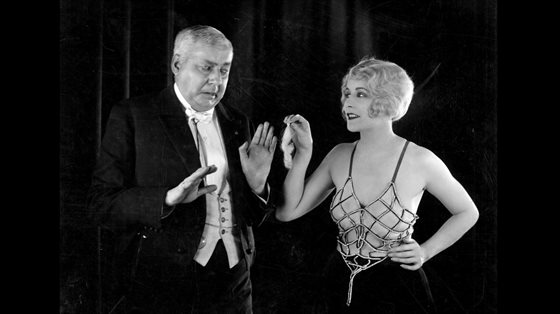A five-day celebration of silent and early sound cinema is coming to Leicester this month – and one of Leicester’s oldest churches is being used as a venue.
The
British Silent Film Festival brings forgotten films back into the spotlight for new fans and old and is co-directed by
Laraine Porter, of De Montfort University Leicester (DMU).

Laraine, who is part of DMU’s Cinema and Television History (CATH) Research Centre, is leading a major research project which looks for the first time at how the British film industry adapted to the advent of “talkies”.
Alongside revealing talks and presentations will be some of the most popular British films in silent and early sound - including PG Wodehouse’s golf stories, a comedy duo dubbed the Danish Laurel and Hardy, moving war dramas and silent films which have only recently been restored.
The festival begins on Wednesday, September 13 with a day-long symposium on the emergence of sound in British cinema and ends with a screening of Edgar Allan Poe films in St Mary de Castro church – complete with candles and organ accompaniment.
Between Thursday and Sunday, the films will be shown at Leicester’s Phoenix Cinema. Click here for a
timetable. Many of the films will be introduced by experts explaining the context and revealing trivia as well as the background to the films.
Highlights include:
• The Pleasure Garden, a romantic comedy which was the directorial debt of Alfred Hitchcock
• Cocktails (1928) starring Pat and Patachon, dubbed the Danish Laurel & Hardy
• Paradise, starring British bombshell Betty Balfour as a girl who falls foul of a fortune hunting baddie in France’s Cote d’Azure
• Rookery Nook (1930), a smash hit farce based on the hugely popular stage plays
• Hirondelle et la Mésange (1920), a silent film made in 1920 showing Flanders after the First World War. This stunning film was not seen for 60 years until its debt at the San Francisco film festival
• Vampyr, a 1932 thriller about a village under the curse of the undead
Laraine said: “In Britain, as in America, the talkies genuinely caught people napping. They really didn’t see it coming, and didn’t think it would last. When you read the records in 1928 people are still talking about it being a fad, or a bit low brow.
“So when they realised they were wrong in 1929 there was a mad rush to convert, which all happened in the space of a year, a crazy timetable.
“We have chosen these films because they show how Britain was before the coming of talking pictures, and how it tried to make the transition. Britain’s first “talkies” were more literary than America, which used musicals and gangster flicks so you find a lot of stage adaptations – they literally took what worked in the theatre and filmed it.”
RELATED NEWS:*
Find out about our world-leading film department at our next open day*
DMU postgraduates in La La Land! *
Rock n roll! Colour footage of Led Zep discovered in archiveLeading silent cinema musicians including Neil Brand, Stephen Horne, Philip Carli, John Sweeney and harpist Elizabeth-Jane Baldry will also be performing.
“I’m very excited about the musicians who will be performing at the festival,” said Laraine. “We have an organist in the church accompanying the Poe films which will be so atmospheric, the acoustics in St Mary de Castro are stunning. For Hirondelle, we have a harpist who will be performing a score that is being written especially for the film.”
Tickets are on sale now for the festival. People can buy day tickets, a five day pass or tickets for three individual events: the Edgar Allan Poe evening, Vampyr and Hirondelle et la Mesange.
The festival is supported by the Arts and Humanities Research Council, the National Lottery and the British Film Institute.
Posted on Monday 4 September 2017